
Tony Visconti: “Bowie had to wait until the last minute before he got the inspiration to write a song”. Photo: Howard Pitkow
In the second half of this special extended interview feature, the respected US producer and songwriter reveals more fascinating insights
Here we continue our interview with legendary record producer and songwriter, Tony Visconti, who became famous for helping craft era-defining albums in the 1970s for T. Rex and David Bowie. If you haven’t already done so already, we urge you to read the first half of this feature, where Tony recalls his first impressions of Bolan and Bowie’s songwriting, and his pivotal role as their collaborator and producer.
Below he elaborates on those relationships, shares his thoughts on what makes a hit record and reveals which superstars he’s been working with lately…
Click here for more interviews
When you were producing Bolan and Bowie, did you use a fundamentally different approach when recording each artist, or were the basics the same?
“The basics were the same. Marc Bolan had his own band by the time we were making the pop records and he’d come in with the band – sometimes I’d go to a rehearsal or two – but quite often he’d come in, especially after Electric Warrior, he was too busy to even rehearse, he was writing songs in hotels and teaching them to the band in the hotel rooms and they’d learn them at sound-checks. So from The Slider onwards, we just were working like the band was session players who walked into the studio for the first time. Those sessions were extremely creative because the band was really, really good, and I might say underrated. We’d do about five backing tracks in a day and pretty much arrange them on the spot – in our DNA we knew that the songs shouldn’t go over four minutes, they shouldn’t really go under three minutes, if possible – and everyone was okay with that. So The Slider was a lot easier to make than Electric Warrior, as a result. If I wasn’t sharp by then, it would’ve been a disaster, but by then my skills were really professional. With Electric Warrior, I could say that was my first real professional album as a producer, where I did everything right!
“Bowie had to wait until the last minute before he got the inspiration to write a song, so often it was the same way that I started a T. Rex album – he’d come in with just ideas and working titles, then the band would be very sharp musicians. He always used the best so that made it very easy to do these things. So yes, the approach was very similar with both artists.”
Were you under pressure to work quickly in the studio, or did you have the luxury of having plenty of time?
“With Bowie – by the time we were making The Man Who Sold The World – Mick Ronson, Mick Woodmansey and I lived to together, so we did actually prepare about half the songs on the album before, so they were really easy to record. But by the time the sessions were scheduled – and I think we had something like four weeks, which is okay – we were short of songs. So songs like Black Country Rock was written as a jam in the studio, on the same day we recorded it. [Bowie] went into the hallway and wrote the lyrics. There were another one or two songs that came together like that. Maybe three were written in the studio. A song like The Width Of A Circle was incomplete – it only had the verse section – and it was only about three minutes long, so we jammed the middle and the end sections. So there were actually two more songs that were created on the spot.
“On the last day of the last mix, we still didn’t have a vocal for After All. So I said to David, ‘I’ve only got a couple of hours to mix this song,’ and he said, ‘Okay, I think I’ve got the lyric now’. This was the first time he really tried my patience, and everyone else’s, with his lack of enthusiasm. He had to get really nervous to write, so on the last day of the last mix we gave him enough anxiety to write that lyric. This happened every album since then, but I got used to it.”
How do you think the role of the producer has changed over the decades?
“Well, it hasn’t changed all that much, because even since the 70s, producers often signed an artist to their own production companies. That’s going on now, but it went on back then too, especially in the 80s it happened quite a bit. Then the producer would sell the ‘package’ to a label, and labels like that the producer became the A&R man as well. This would apply to groups mainly. Nowadays producers are more famous because they’re often artists themselves, like Trent Reznor and Dr Dre, and as famous as the artists they produce. But it’s basically the same set-up: producer, artist, label, marketing… It’s all blended in a bit more these days.
“I’m still producing the way I’ve always done and I haven’t really changed much. I work with labels but I always support the artists before the label. I made those great records in the 70s without much label interference – they were happy to sign these people and they just wanted me get on with it and make a great album. These days I work the same way and they know what sort of person I am. You know, they’re just crying for a hit record, really, that’s all they want. And I know how to do that!”
Do you think you can define what makes a hit record?
“When you think you have a hit, you don’t get it, it doesn’t work. Then when you don’t know it, you suddenly have a hit. It works against you. There are a few things you can do, but this is standard formula stuff. Obviously, have a catchy chorus – the chorus is everything in a hit record – it’s got to be memorable from the first time it’s heard. The lyrics can’t be too challenging, but they have to be good enough to be quality.
“Then something like Bohemian Rhapsody comes along and breaks all the rules! Breaking the rules makes the biggest hits. And then what will usually follow are pale imitations of that, and the public gets tired of listening to the same old same old. Because this business is notorious for chasing its tail, it’s the law of diminishing returns. So the real innovators like Pharrell will come up with a new slant and I really do respect him as a producer who takes risks these days, when others wouldn’t.”
“WITH BOWIE SOMETIMES EVEN THE WORDS WERE JAMMED!”
Will you always create a production around a fully formed song, or do you ever make a head start producing a track before the song’s ready?
“With David [Bowie] it was both ways, but I always say a song should sound good on voice and guitar or piano. From there, the arrangements start forming in my head and I’ve done that with many other artists. Or if some sort of jam happens in the studio, like with Fashion. I think, Scary Monsters… was a jam as well. And so was Fantastic Voyage which we used the exact chord changes as we used for Boys Keep Swinging, even the same key and the same structure. We thought those changes were so clever and so nice that we recorded three songs that way, but only two of them became real songs. With Bowie sometimes even the words were jammed!
“Although not all artists can do that, for instance, Thin Lizzy couldn’t – they really had to write their songs. Phil Lynott thought it was a great idea, but I remember wasting hours and hours because it was just not in his make-up to do that.
“There’s no one way to do it, is what I’m saying. It’s so nice to be open and versatile because the greatest ideas come from spontaneity. Over-thinking makes a very complicated song – too many chords, too many twists and turns. It’s only pop music, it’s an art, but it’s not Beethoven!”
You’ve worked with so many incredible icons in your career, but who’s missing from that list? Who would you have loved to produce?
“I worked with Paul McCartney as an arranger on Band On The Run, but I really think I can make a great record with him as a producer. We came ever so close, and over the years we’ve kept in touch – I’ve seen him as recently as last Christmas – and there’s affection there. He knows I’d like to produce him, but we’ll see. I’m an American who spent 22 years in Great Britain, I know both worlds like the back of my hand, so I’d the perfect guy for him!”
What else have you been up to lately?
“I’ve been doing sessions with Perry Farrell of Jane’s Addiction, and I think we’re doing some great work together. I’ve met up with Damon Albarn from Blur and Gorillaz of course, and we’re in talks – that’s looking bright and sunny. I’m working with a young woman in Hamburg called Holly Macve and she’s an amazing singer-songwriter. There’s also a brand new album from Kristeen Young that’ll be out in September. Oh and I’ve been working with Daphne Guinness as well, on her second album – she’s a great songwriter and I love her music.”
You’re still keeping very busy then?
“I’ve had an incredibly busy year. From here til December, I don’t know how I’m going to catch my breath! I’ve got a lot of work ahead of me and I’ve got the television show on Sky Arts.”
How do you choose which artists to work with?
“I only pick people who I really like, both as artists and as people. If someone was totally, morally different from me and drank too much – something that really would be an obstacle – I couldn’t work with them. I’ve been through that in the past and it’s so hard. So virtually everyone I work with, I’m compatible with as a human being. But the main thing is they have to have a great songs and a great voice – they don’t have to be opera singers, but they have to have a voice that’s unique. That goes for Morrissey, David Bowie, Marc Bolan and then Holly Macve and Kristeen Young: they have one-of-a-kind voices and that’s what I look for. I’m not a generic person; I only work with these unique, strange people!”



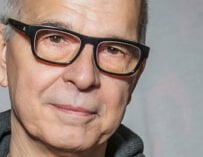
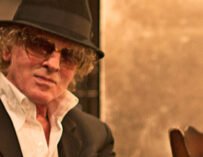
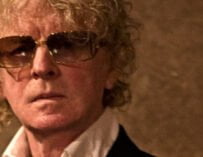
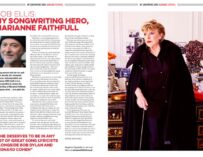

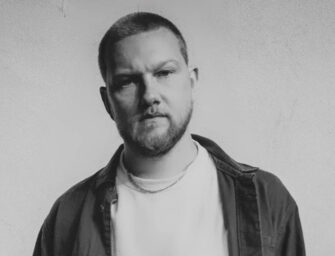























Related Articles